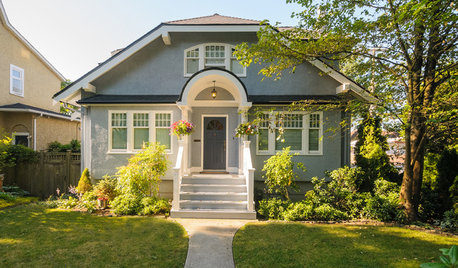offer - contingent on their house sale
t-mac-mo
16 years ago
Related Stories

TRADITIONAL ARCHITECTURERoots of Style: Georgian Homes Offer Familiarity Through the Ages
Americans have been embracing this interpretation of classical architecture since the 1700s. Does your home show off any Georgian details?
Full Story
SMALL HOMES12 Studio Homes Offer Grand Small-Space Inspiration
These compact apartments and minihouses don't skimp on function or comfort. See how great design has made them enormously livable
Full Story
TRAVEL BY DESIGN9 Vacation Farmsteads Offer a Taste of Country Life
Have a hankering for fresh air and even fresher food? Try a farmhouse, cabin or well-equipped tent for your next vacation
Full Story
GARDENING GUIDESGreat Design Plant: Lindera Benzoin Offers 3-Season Interest
Support wildlife and enjoy the aromatic leaves of this U.S. native also known as spicebush, Benjamin bush and spicewood
Full Story
SELLING YOUR HOUSEFix It or Not? What to Know When Prepping Your Home for Sale
Find out whether a repair is worth making before you put your house on the market
Full Story
SELLING YOUR HOUSEYour Home-Selling Guide for a Faster and Better Sale
Learn staging and curb appeal tricks, how to get the best photos and more in this roundup focusing on high-impact house-selling strategies
Full Story
SELLING YOUR HOUSEHow to Stage Your Kitchen for a Home Sale
Attract buyers with a kitchen that’s clean, bright and welcoming — no expensive overhaul required
Full Story
SELLING YOUR HOUSEHow to Decorate for the Holidays When Your Home Is for Sale
You can make your home appealing to potential buyers and still celebrate the season. Here are 7 tips to keep in mind
Full Story
MOVINGWhat Those Home-Sale Disclosures Are Really Saying
Avoid costly surprises by knowing what’s included in a home seller’s disclosure, what’s not and what you can do if you suspect foul play
Full Story
EVENTS2016 Palm Springs Modernism Week Tickets Go on Sale
November 1 is the first day to buy tickets to the February festival celebrating 20th-century architecture and design
Full Story







camchez
bethesdamadman
Related Professionals
Coshocton General Contractors · Country Walk General Contractors · Leon Valley General Contractors · Markham General Contractors · Norristown General Contractors · Poquoson General Contractors · Rancho Santa Margarita General Contractors · Tabernacle General Contractors · West Mifflin General Contractors · Wright General Contractors · Wyomissing General Contractors · Honolulu Home Stagers · Norwalk Home Stagers · Jacinto City Interior Designers & Decorators · Shorewood Interior Designers & Decoratorsjy_md
t-mac-moOriginal Author
qdognj
lorrainebecker
dianemargaret
xamsx
cordovamom
sweet_tea
terezosa / terriks
ojoy119
berniek
terrig_2007
kathyg_in_mi
t-mac-moOriginal Author
sweet_tea
t-mac-moOriginal Author
c9pilot
ladynimue
t-mac-moOriginal Author
cordovamom
ladynimue
cordovamom